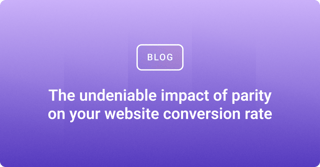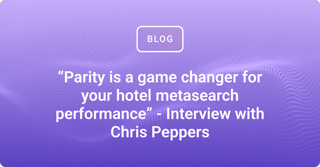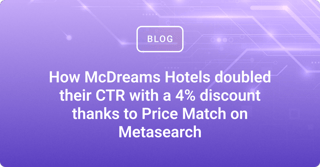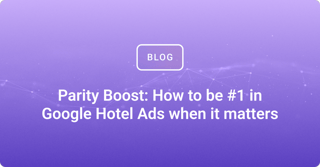There used to be a time when 'parity management' mainly meant keeping tabs on Booking.com and Expedia to check they weren't undercutting you. You knew that savvy consumers would check their favorite booking sites as well as your direct website, so it was crucial to make sure your direct booking channel was just as attractive - if not more so - than the big brands.
But with the rapid growth of metasearch driven by Google Travel in recent years, the complexity of parity management has risen exponentially. Meta puts price comparison front and center of its offering: there's nowhere for an out-of-parity rate to hide. And the number of players in the game has grown too. Ask a revenue manager what makes them lose sleep at night, and you're likely to hear more than a few mentions of 'random.coms' - uncontracted OTAs and booking sites that pop up in metasearch auctions with steeply discounted rates.
So how much could poor parity be impacting your metasearch performance - and what can you do to fix it? In this article, we've put together a refresher on how to deal with common parity problems.
Why parity matters on metasearch
It's a truth universally acknowledged that having the best price matters. It increases website conversion rates, it increases consumer trust in your brand, and it reinforces the message that it's best to book direct. But it's worth reiterating just how much it matters on metasearch.

We've found that when hotels have the best rate available on metasearch, they generate double the revenue of hotels with rates that are similar to, or worse than, OTAs. The single most impactful thing you can do to drive more revenue through metasearch is to make sure you have the best rate. And even if your distribution agreements prohibit you from publicly offering a cheaper price than e.g. Booking.com, it's imperative that you still strive for parity. We've previously found that booking engine conversion rates drop by over a third when a hotel is regularly undercut on price.
Want to know how often your direct rate is undercut on metasearch? Email info@triptease.com to request your own customized report.
If you use Triptease for metasearch, our unique parity blackout feature will automatically remove your rate from the meta auction if it is undercut below a certain threshold, protecting your brand and improving the efficiency of your bids. But in an ideal world, your rate should be present and competitive in as many auctions as possible. Here's how to make that happen.
Getting to the root of your parity problems
The number-one thing we suggest when it comes to parity is to make sure you're regularly checking how your rates compare to OTAs. A tool like Triptease's Parity Monitor performs live rate checks when guests search for your hotel, and automatically identifies high-impact disparities for you to address. Getting your partners in line is much easier when you have strong, reliable evidence of their undercutting that you can share with your market manager.
But what about sites like Snaptravel (who are often cited by hoteliers as a repeat offender when it comes to breaking parity on metasearch)? When you don't have a commercial relationship with the site selling your rates, it may well feel like you have no course of action to correct the issue.
However, there are several things you can do - starting today - to get your parity back on track. Every 'rogue rate' you spot on metasearch, however unwelcome, is a clue to a hole in your distribution strategy that can be fixed.
The most common cause of rate leakage to so-called 'random.coms' (sites with whom your hotel has no commercial relationship) is rates originally intended for wholesale being 'unbundled' from their original conditions of sale, often then changing hands several times before ending up on a B2C travel site which advertises that rate on metasearch. The best way to combat undercutting on metasearch is to stop those unauthorised rates being distributed in the first place.
Start by taking a step back from your immediate parity issue and instead look at the big picture of your distribution strategy. Here are some questions you can ask yourself:
- How many different distribution partners are involved?
- Have you evaluated the incremental business that each partner brings?
- Are they actually doing the job you contracted them to do? If you want them to bring long-lead-time business, have you checked whether they're actually bringing you bookings with a 1-day lead time?
- If you work with ten wholesalers, have you tested to see whether you could achieve the same business with just two?
- Has your target market shifted over the last twelve months due to Covid? Has booking behavior among your guests changed, and if so are your distribution partners still the right fit?
You can also spot-check your distribution issues when you see a rogue rate out in the wild by performing a test booking - i.e. booking the rate you find on a 'random.com' then checking your PMS to see which partner it originates from. Some hoteliers employ a 'three strikes and you're out' policy whereby they will cut off any partner who they find to be repeatedly violating the terms of their agreement.
It might not feel like a quick fix, but a strong foundation to your distribution strategy is crucial to good parity and great metasearch performance. This interview with Wyndham's then-VP Channel & Distribution Strategy goes into more detail on how you can make sure you've got a strategy that works well for you. As he says, if a partner's value isn't clear, "it's time to question whether the rate disparity from that distributor is causing more damage than the business they bring."
If you need more advice and guidance on managing your wholesale rates, check out these articles:
- Best practices for managing parity in wholesale
- Can I stop OTAs from displaying wholesale rates?
- "We need a revolution in thinking about wholesalers"
- Could your hotel's channel strategy be costing you direct bookings?
- What you need to know about hotel rate parity.
Taking the fight to the 'random.coms'
As well as addressing the root cause of their parity issues, some hoteliers also take a 'whack-a-mole' approach to acting on rate violations where they find them. Colette Labis, Director of Partnerships & Distribution at Westgate Resorts, spoke at our Direct Booking Summit in Miami about how she cracked down on 'random.coms' via legal action.
"At Westgate, we start with a C&D (Cease and Desist) notice that clearly defines our expectations and what our next steps will be should they not be met. This has proven to be more than sufficient at initiating the conversation with the random.com that’s wreaking havoc with rogue rate distribution and contract violations as affiliates of third parties."
While every hotel's circumstances will be different, it may well be worth diving into the detail of your contracts to see whether clear violations are taking place.
Ensure you have the best rate on meta with member rates
Whilst addressing the root causes of your parity problems is important for long-term success, you can also make immediate gains on metasearch by advertising a discounted member rate to make sure you have the best price. Google allows advertisers to display closed-user-group (CUG) rates in the metasearch auction, and crucially you're not required to actually publicly show the lower rate.
What many hoteliers choose to do is show their BAR price with a 'strikethrough' alongside the CTA 'Get price'. Once the guest clicks and lands on your booking engine, they must take some form of 'meaningful action' (e.g. signing up to a membership program) to checkout with the lower rate.
Hoteliers using member rates tend to see a marked increase in their clickthrough rates from meta. Speak to your metasearch provider if this is a tactic you want to make use of.
Let us know how we can help
Still have questions about how best to manage your parity? Concerned or confused about TripAdvisor Plus? Get in touch with one of our friendly market experts today for a chat about your current parity status and how it could be improved!
Lily is Lead Product Marketing Manager at Triptease. When she's not investigating the industry or spreading the word that #DirectIsBest, she enjoys music, cycling, and obscure radio quiz shows.








